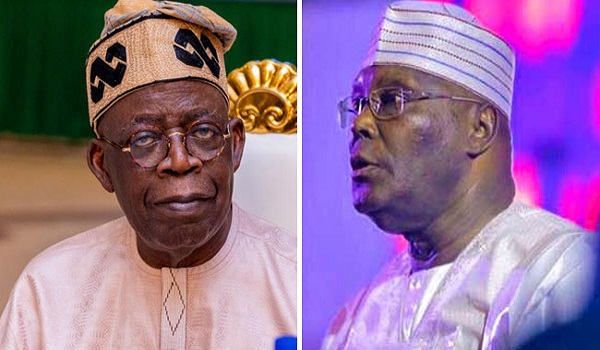Activities that will culminate in producing the fifth president in the Fourth Republic have since begun. Eighteen political parties have gotten the nod of the Independent National Electoral Commission (INEC) to contest next year’s presidential election. Many of them have unveiled their manifestoes, while others are yet to do so. However, the race is likely to be mainly between the candidates of the two major political parties, the All Progressives Congress (APC) which is being represented by former Lagos State governor, Asiwaju Bola Ahmed Tinubu and the main opposition party, the Peoples’ Democratic Party (PDP) that has former Vice President Atiku Abubakar as its flag bearer.
Tinubu’s Action Plan is titled “Renewed Hope”, while that of Atiku is “Covenant with Nigerians”. Former Anambra State governor, Peter Obi of the Labour Party (LP) may not be able to sustain the tempo with which he started and therefore, may not be a match for the candidates of the two major parties. Besides, he has not unveiled any manifesto, though, on several occasions, he has spoken about Nigeria’s problem with figures and statistics, which some have however, questioned.
Traditionally, candidates seeking elective offices are required to present manifestoes or policy documents to the voters about their plans and programmes, which they intend to implement if elected. A good manifesto is expected to state problems or challenges and also provide how to tackle them. From the manifesto, the citizens can gauge each candidate’s developmental plans, ideas and strategies or a political party.
Tinubu’s 80-page Action Plan, highlighted key areas, including the provision of job opportunities for young people; giving manufacturing its rightful place; surplus balance of trade (i.e export more than import); strong policies to boost agriculture; modernizing public infrastructure; harnessing emerging economic sectors (entertainment, sports, arts, digital space etc); socio-economic inclusion for the most vulnerable people; electricity generation; affordable healthcare, education, and housing for all; and establishing adaptable national security policy. The APC’s candidate’s manifesto aims at achieving a Gross Domestic Product (GDP) growth of N780.9bn by 2027 from N440.8bn in 2021 at the rate of 10 per cent per annum.
On the other hand, Atiku’s 5-point agenda envisions tackling the current lingering insecurity to guarantee the safety and security of lives and property, build a dynamic economy for prosperity, re-structure the polity to foster unity and stability, as well as provide qualitative education. Atiku has promised to restore Nigeria’s fractured unity, as well as rebuild the nation’s battered economy back to the pre-2015 level, where the country was the strongest economy in Africa, with a GDP of $546.7billion, as against the current GDP of $440billion.
The two candidates’ has promised to restructure but in different formats. Tinubu has promised a comprehensive constitutional review, equitable resource allocation, judicial independence, and local government autonomy, while Atiku wants to achieve more devolution of powers to the states and local governments.
Economy:
In the area of the economy, Atiku said he would within 100 days in office if elected; launch a $10 billion Economic Stimulus Fund. Atiku said the fund would prioritise support to micro, small and medium-scale enterprises that offer the most significant opportunity for inclusive economic growth.
The PDP presidential candidate said he would rather privatise Nigeria’s dilapidated refineries rather than spend $1.55 billion on their revitalisation.
“We will operate a liberal economy that allows small businesses to grow through lower taxes and charges for small businesses and low-income earners. We will encourage the expansion of the private sector to spur economic growth.”
On his part, Tinubu has pledged to diversify the Nigerian economy and create wealth for the development of the nation. He said Nigeria is sitting on a gold mine with abundant natural resources, adding that with strategic investment in research and development and effective management the nation can explore these resources to the fullest.
He said: “There is no local government in Nigeria that has no resource or endowment that can be harnessed for greater economic development.
“Our major economic challenges are underinvestment and effective management, and these are what I am bringing to the table. Our economic plan would utilize the vast natural resources we have, through strategic investment in infrastructure which will lead to the diversification of the economy and wealth creation across the entire country.
“We will pay attention to modern economic drivers such as the digital economy, creative industries, sports and entertainment sectors for the benefit of our young people.”
On the nation’s economy, he said the APC Presidential Candidate assured Nigerians that his administration will focus on the massive and unprecedented 4th industrial revolution, helping the youth to be transformed from job seekers to job providers.
Tinubu administration will strive to create one million new jobs in the ICT sector within its first 24 months in office. Our plan includes interventions in the ICT Industry and other critical sectors of the Nigerian economy where the deployment of new technologies can fast-track business growth and diversification.
Tinubu plans to create one million new jobs in the ICT sector within its first 24 months in office. Our plan includes interventions in the ICT Industry and other critical sectors of the Nigerian economy where deployments of new technologies can fast-track business growth and diversification.
Tinubu assured Nigerians that his administration will focus on the massive and unprecedented 4th industrial revolution, helping the youth to be transformed from job seekers to job providers.
On security which he affirms to be the “bedrock of a prosperous and democratic society”, Tinubu says his administration will make it a fundamental responsibility to protect the lives and property of its citizens by mobilising the country’s national security, military and law enforcement assets to protect all Nigerians from danger and from the fear of danger. Our administration will be committed to permanently securing the safety, freedom and prosperity of all Nigerians,”
To achieve this, Tinubu promised to further equip the armed forces with more modern hardware and needed technological support, even as he also said police will be reformed to fully take responsibility for internal security.
“Police reform will be focused on positioning the institution to better deliver on its primary duties of community policing and maintaining law and order through crime fighting and prevention.
“Police personnel will be freed from extraneous duties such as VIP security and guard duties. VIP security and provision of security for government buildings, installations and other critical assets will be transferred to The Nigeria Security and Civil Defence Corps (NSCDC). The NSCDC shall be evaluated and reformed to be better integrated with our internal security apparatus,” he further quoted Tinubu.
Atiku promised to restore security and whatever it is going to take us to do that would be pursued to a logical conclusion so that you can move day and night, and go to your farms anywhere and anytime.
“By that what we mean is that we will put more policemen on the streets, we will equip and fortify them. Since we have promised to devolve more power to state and local governments, you can also have your local police and also make sure that your local police do not harass you”.
Atiku, who noted that our military forces are fighting on the front lines without equipment and morale, assured that if he is elected, his government will increase the welfare of all security forces; use modern technology and intelligence to combat insecurity and will also increase the number of personnel for our security agencies.
According to the Waziri of Adamawa, national security is the first sign of a functional government, and where it does not exist, we must not blame those who threaten it. “We can only blame a government that allows it to be threatened. And if I am elected as your President, insecurity is one thing I will not tolerate.
“Under my leadership, we will ensure absolute security because that is the number one condition for economic prosperity” he assured.
Education:
Tinubu promised to bring reforms to Nigeria’s education sector from the basic to the tertiary level.
He said his administration if elected, would review the education curriculum at all levels “to suit the emerging global best practices and current socio-economic realities.”
He said the curriculum will be reviewed to ensure that Nigerian graduates become conversant with global trends in different fields and sectors where they can contribute productively to the country’s economy.
“This will ensure, our graduates at tertiary level are not only trained for white-collar jobs, but they will be enterprising and innovative,” he said.
Tinubu said he will equip selected universities in each of the six geo-political zones to function as centres of excellence for students of humanities, fine arts, film, and culture. We will partner with investors and industry experts to create an animation hub to help young talent take advantage of such opportunities and indeed, to build their own brands. Such a space will allow animators to share costs create synergies and collaborate on ambitious projects.
The PDP candidate said education should be free to every Nigerian; at least up to the secondary school level. His words: “I know the value of education; if not because of education, what kind of value would someone like me, a poor child from a small village would have added to Nigeria?
“That is why I established an educational community in my hometown, where I built schools from kindergarten to university all in one place to provide education to the promising younger generation. The success of any educational policy is not measured based on the number of bodies in classrooms or schools alone but also on the quality and relevance of the education. That is why we will invest in improving access and quality of education.
Health:
Healthcare, according to Tinubu, is a matter of right and urgency. According to the blueprint, Tinubu’s healthcare reforms and policy agenda are to be defined by the concept of Universal Health Coverage (UHC). By making universal coverage a primary objective, he proposes to create new jobs and bring greater economic and social development to Nigerians.
Challenges that Tinubu will address in the health sector include inadequate health infrastructure, fragmentation, an overburdened workforce, poor insurance coverage, high maternal and infant mortality, inadequate preventative care and dependence on imported medicines and vaccines.
To stem the brain drain, a deliberate policy will be implemented to retain skilled manpower while incentives will include performance-based salary increases, health insurance to cover family members favourable mortgage or home-ownership plans for health workers, and tertiary education scholarships for their children; performance-based salary increases, favourable mortgage or home-ownership plans for health workers and tertiary scholarships for their children.
Atiku said every Nigerian must have access to affordable and decent healthcare. No Nigerian should be afraid of falling sick just because they cannot pay for the hospital bill. We will strengthen our healthcare programs so that every Nigerian can have access to the required minimum healthcare quality.





